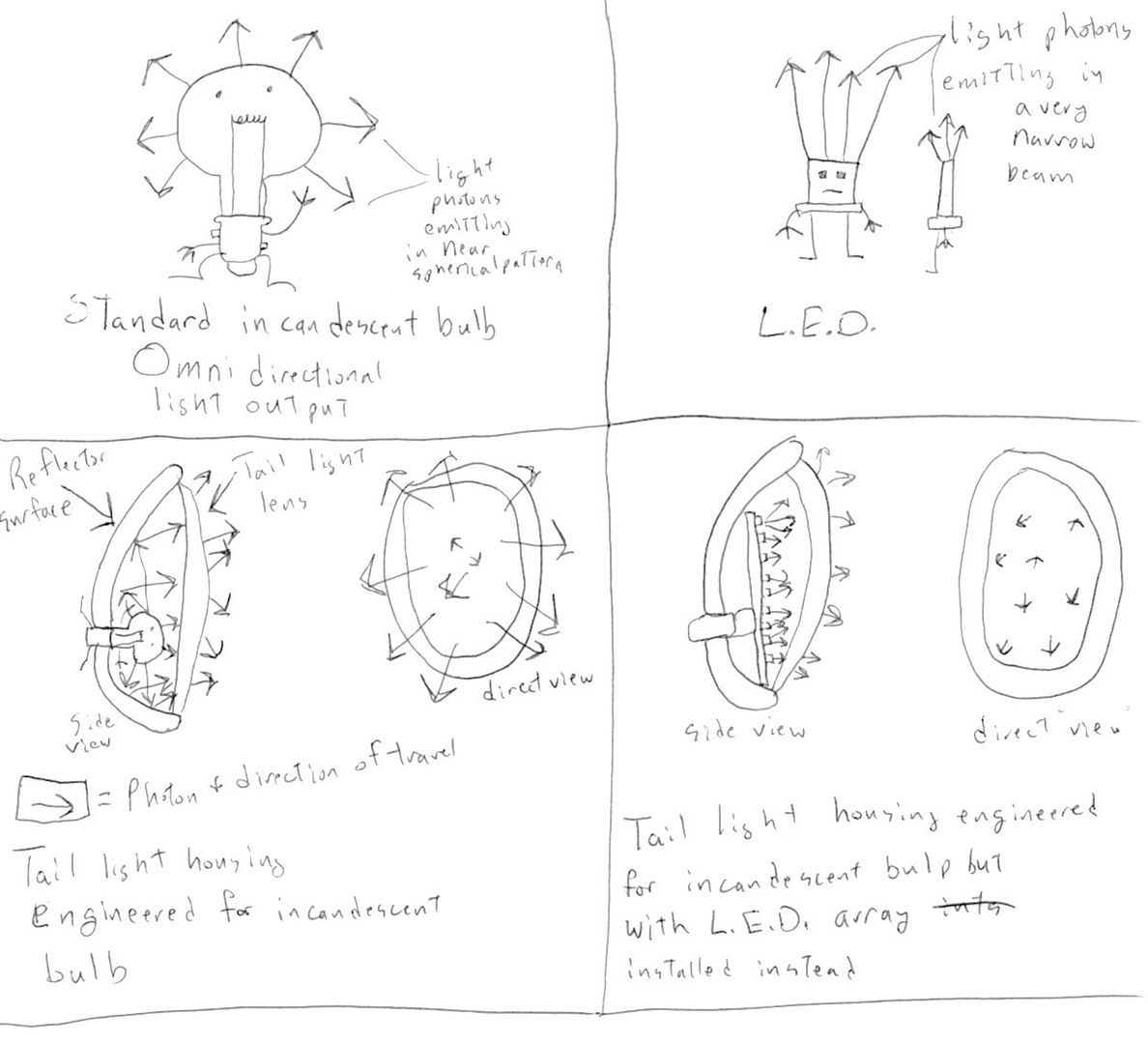OK- I will attempt to clarify the problem with LED bulbs by means of an incredibly grossly oversimplified diagram and explanation.

The arrows in the pictures are representative of the photons emitted by the light source and their direction of travel.
To understand the problem with nearly all LED products designed to be retrofitted to any headlight, brake light, side running light, or turn signal assembly originally engineered to used incandescent bulbs, you must first accept as true several facts: (1) there are strictly regulated standards about how bright and where and in what direction the "brightness" goes for every tail lamp (I will use tail lamp as a generic term to refer to all regulated lamp housings, and I will use "beam pattern" as a generic term to refer to the legally required light output pattern); (2) the engineers employed by automobile manufacturers have spent millions of dollars and tens of thousands of hours calculating and creating the tail lamp housings that have beam patterns that meet the standards; (3) the beam pattern is controlled by three things: the three dimensional shape of the reflector at the back of the lamp, the shape and refraction properties of the lens, and the distance from and position of the light source in relation to the reflector.
As my oversimplified diagram shows, standard incandescent bulbs have a near omnidirectional, or spherical light output. The only spot that doesn't get light is the stem of the bulb. LED "bulbs" emit light (photons) in a very narrow band, nowhere near the omnidirectional dispersion of an incandescent bulb.
The reflectors and lenses on older tail lamps were designed to meet the beam pattern standard assuming that the light source was an incandescent bulb with the filament in a predefined location in relation to the reflector and lens. See how the arrows not only go directly out the taillight lens, but also bounce back to the reflector and then out the front (that's why it's called the reflector). This "bouncing" or refraction combined with the naturally omnidirectional emission pattern of the incandescent bulb sends the photons in a much wider dispersal than does the LED array.
Changing the light source from an incandescent bulb to an LED array wreaks havoc on the beam pattern because the light photons no longer travel in the path the designers of the lamp housing assumed the light would travel in. Depending on the LED retrofit method, the photons no longer reflect of the reflector, or do so in a much diminished volume, which changes their path in relation to the lens. Further, the majority of the photons no longer strike the lens traveling in paths comparable to the paths engineers presumed the photons would be traveling when the lamp was designed. The end result is a beam pattern that will look bright, in fact brighter than the incandescent bulb, from directly behind the lamp housing, but that, were it to be properly measured, no longer meets the beam pattern standards. Of significant concern is the drastic reduction in light dispersal to the sides of the lamp.
Note the arrows coming out of the lamp housing in the picture I drew above. You can see that with an incandescent bulb, the photons are more widely dispersed to the side as well as directly to the rear of the lamp. Now, see how the photons are concentrated almost directly to the rear of the lamp when the LEDs are used instead of the incandescent bulb. The LED equipped lamp no longer has a beam pattern that meets the legal standards. Thus, by legal definition, the lamp equipped with LEDs is no longer a safe lamp to have operating on a vehicle.
For a simple experiment to demonstrate this principle, get a shiny metal bowl and a flashlight (such as a mag lite) that has an adjustable beam pattern. Set the beam to as broad a pattern as it will go (or, if possible, remove the head unit altogether so there is just a naked bulb shining on the end of the flashlight). Now, turn off the lights, point the cupped side of the bowl at the wall, and shine the wide beam pattern/unshrouded flashlight into the bowl. Note the pattern of the light on the wall.
Now, narrow the beam pattern as far as it will go (if the head unit was removed, reinstall it and narrow the beam pattern), and shine the light into the bowl in rough the same position and direction. Note how the beam pattern has changed. Beam pattern with the wide beam setting on the flashlight is an incandescent bulb and the narrow setting is an LED.
That experiment should demonstrate to you why it is night on impossible to create any sort of LED bulb or array that will ever be abled to be installed in a lamp housing designed for an incandescent bulb and still satisfy the beam pattern standards.
Hopefully this helps. Remember that this is an extremely gross oversimplification, but the principle is the same.
And, no, light bulbs and LEDs don't really have arms, legs, and eyes. And please remember, "Damn it Jim! I'm a lawyer, not an engineer!"